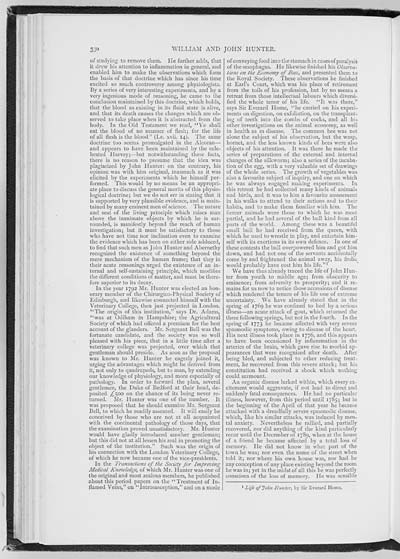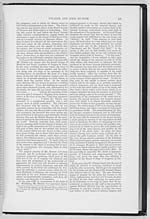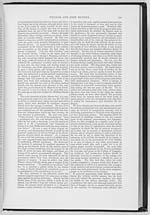330
of studying to remove them. He further adds, that
it drew his attention to inflammation in general, and
enabled him to make the observations which form
the basis of that doctrine which has since his time
excited so much controversy among physiologists.
By a series of very interesting experiments, and by a
very ingenious mode of reasoning, he came to the
conclusion maintained by this doctrine, which holds,
that the blood as existing in its fluid state is alive,
and that its death causes the changes which are ob-
served to take place when it is abstracted from the
body. In the Old Testament we read, "Ye shall
eat the blood of no manner of flesh; for the life
of all flesh is the blood" (Le. xvii. 14). The same
doctrine too seems promulgated in the Alcoran�
and appears to have been maintained by the cele-
brated Harvey;�but notwithstanding these facts,
there is no reason to presume that the idea was
plagiarized by John Hunter: on the contrary, his
opinion was with him original, inasmuch as it was
elicited by the experiments which he himself per-
formed. This would by no means be an appropri-
ate place to discuss the general merits of this physio-
logical doctrine; but we do not err in stating that it
is supported by very plausible evidence, and is main-
tained by many eminent men of science. The nature
and seat of the living principle which raises man
above the inanimate objects by which he is sur-
rounded, is manifestly beyond the reach of human
investigation; but it must be satisfactory to those
who have not time nor inclination even to examine
the evidence which has been on either side adduced,
to find that such men as John Hunter and Abernethy
recognized the existence of something beyond the
mere mechanism of the human frame; that they in
their acute reasonings urged the existence of an in-
ternal and self-sustaining principle, which modifies
the different conditions of matter, and must be there-
fore superior to its decay.
In the year 1792 Mr. Hunter was elected an hon-
orary member of the Chirurgico-Physical Society of
Edinburgh, and likewise connected himself with the
Veterinary College, then just projected in London.
"The origin of this institution," says Dr. Adams,
"was at Odiham in Hampshire; the Agricultural
Society of which had offered a premium for the best
account of the glanders. Mr. Sergeant Bell was the
fortunate candidate, and the society was so well
pleased with his piece, that in a little time after a
veterinary college was projected, over which that
gentleman should preside. As soon as the proposal
was known to Mr. Hunter he eagerly joined it,
urging the advantages which might be derived from
it, not only to quadrupeds, but to man, by extending
our knowledge of physiology, and more especially of
pathology. In order to forward the plan, several
gentlemen, the Duke of Bedford at their head, de-
posited �500 on the chance of its being never re-
turned. Mr. Hunter was one of the number. It
was proposed that he should examine Mr. Sergeant
Bell, to which he readily assented. It will easily be
conceived by those who are not at all acquainted
with the continental pathology of those days, that
the examination proved unsatisfactory. Mr. Hunter
would have gladly introduced another gentleman;
but this did not at all lessen his zeal in promoting the
object of the institution." Such was the origin of
his connection with the London Veterinary College,
of which he now became one of the vice-presidents.
In the Transactions of the Society for Improving
Medical Knowledge, of which Mr. Hunter was one of
the original and most zealous members, he published
about this period papers on the "Treatment of In-
flamed Veins," on "Introsusception," and on a mode
of conveying food into the stomach in cases of paralysis
of the �sophagus. He likewise finished his Observa-
tions on the Economy of Bees, and presented them to
the Royal Society. These observations he finished
at Earl's Court, which was his place of retirement
from the toils of his profession, but by no means a
retreat from those intellectual labours which diversi-
fied the whole tenor of his life. "It was there,"
says Sir Everard Home, "he carried on his experi-
ments on digestion, on exfoliation, on the transplant-
ing of teeth into the combs of cocks, and all his
other investigations on the animal economy, as well
in health as in disease. The common bee was not
alone the subject of his observation, but the wasp,
hornet, and the less known kinds of bees were also
objects of his attention. It was there he made the
series of preparations of the external and internal
changes of the silkworm; also a series of the incuba-
tion of the egg, with a very valuable set of drawings
of the whole series. The growth of vegetables was
also a favourite subject of inquiry, and one on which
he was always engaged making experiments. In
this retreat he had collected many kinds of animals
and birds, and it was to him a favourite amusement
in his walks to attend to their actions and to their
habits, and to make them familiar with him. The
fiercer animals were those to which he was most
partial, and he had several of the bull kind from all
parts of the world. Among these was a beautiful
small bull he had received from the queen, with
which he used to wrestle in play, and entertain him-
self with its exertions in its own defence. In one of
these contests the bull overpowered him and got him
down, and had not one of the servants accidentally
come by and frightened the animal away, his frolic
would probably have cost him his life."1
We have thus already traced the life of John Hun-
ter from youth to middle age; from obscurity to
eminence; from adversity to prosperity; and it re-
mains for us now to notice those accessions of disease
which rendered the tenure of his life one of extreme
uncertainty. We have already stated that in the
spring of 1769 he was confined to bed by a serious
illness�an acute attack of gout, which returned the
three following springs, but not in the fourth. In the
spring of 1773 he became affected with very severe
spasmodic symptoms, owing to disease of the heart.
His next illness took place in 1776, and this appears
to have been occasioned by inflammation in the
arteries of the brain, which gave rise to morbid ap-
pearances that were recognized after death. After
being bled, and subjected to other reducing treat-
ment, he recovered from this severe attack; but his
constitution had received a shock which nothing
could surmount.
An organic disease lurked within, which every ex-
citement would aggravate, if not lead to direct and
suddenly fatal consequences. He had no particular
illness, however, from this period until 1785; but in
the beginning of the April of that year he became
attacked with a dreadfully severe spasmodic disease,
which, like his similar attacks, was induced by men-
tal anxiety. Nevertheless he rallied, and partially
recovered, nor did anything of the kind particularly
recur until the December of 1789, when at the house
of a friend he became affected by a total loss of
memory. He did not know in what part of the
town he was; nor even the name of the street when
told it; nor where his own house was, nor had he
any conception of any place existing beyond the room
he was in; yet in the midst of all this he was perfectly
conscious of the loss of memory. He was sensible
1 Life of John Hunter, by Sir Everard Home.

![]() Universal Viewer |
Universal Viewer | ![]() Mirador |
Large image | Transcription
Mirador |
Large image | Transcription
![]()

